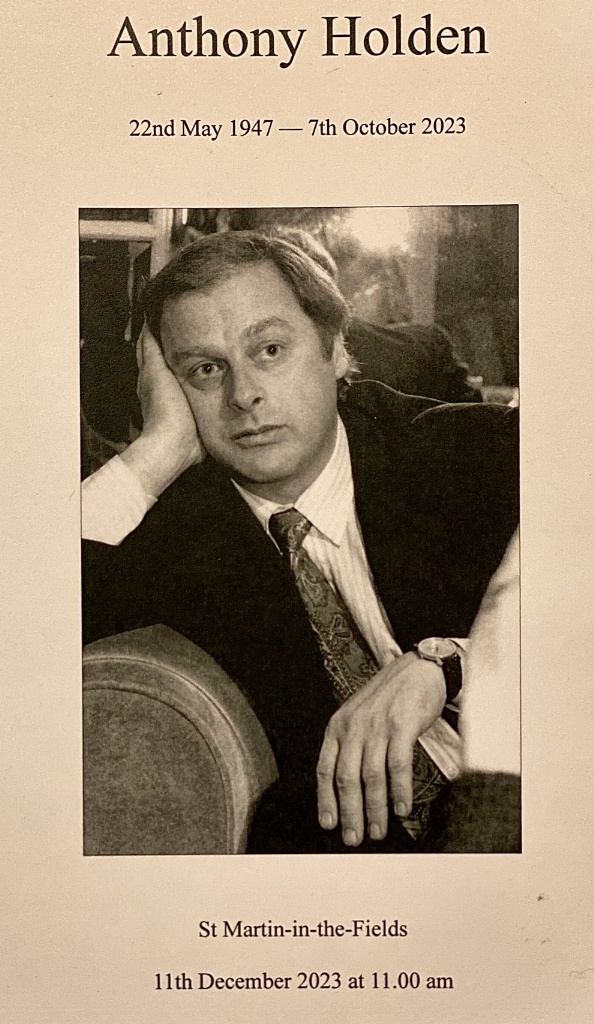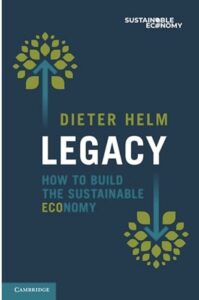Remembering Tony Holden

On Monday I went to the Memorial Service for Tony Holden in St Martin-in-the-Fields. He was one of the best journalists of his generation, but also a hospitable friend and a writer who was vastly more erudite that any of his journalistic peers. He wrote, co-authored or edited 35 books for example, including: a fine book on Tchaikovsky; an accomplished biography of Shakespeare as well as biographies of Laurence Olivier and Mozart’s librettist, Lorenza Da Ponte. He was also a translator — of Don Giovanni (co-authored with Amanda, his first wife), Aeschylus and Greek pastoral poetry. Crowning it all was a bestseller — Big Deal: A Year as a Professional Poker Player — on his lifelong obsession: poker. And, finally, a nice autobiography, Based on a True Story, written after the stroke that damaged his body but not his mind.
Our journalistic paths crossed occasionally, but I really got to know him through our shared friendship with Frank Kermode, the great literary critic. Among other things, this led to many memorable journalistic lunches in our favourite hostelry, the Three Horseshoes in Madingley.
The Church was packed for a nicely-choreographed memorial service which included readings and memoirs by his three sons and many grandchildren, plus tributes by Alan Samson, Melvyn Bragg, Magnus Linklater, Tina Brown and Gyles Brandreth. There was nice music, two sterling hymns (Abide with Me and Jerusalem) and a live rendition of that politically-incorrect duet from Don Giovanni, La ci darem la mano (see today’s Musical Alternative).
The one complaint I had was that nobody mentioned that in his youth Tony had been a scratch golfer. But maybe you need to play the game to know what that means. (Hint: it means he was bloody good.)
The coup de grace, though, came at the end, when each pew was given a basket of poker chips, from which we each took one as a token of remembrance of a fine journalist and a memorable friend.

Quote of the Day
”Holding Cop28 in the United Arab Emirates is like hosting a Narcotics Anonymous meeting at a drug dealer’s house. Fossil fuel is the narcotic to which all countries present at the UN summit are addicted and Sultan Ahmed Al-Jaber, president of this year’s negotiations, is a top international dealer.”
- Cara Augustenborg, writing in yesterday’s Irish Times
Musical alternative to the morning’s radio news
Mozart: Don Giovanni, K. 527 | Act 1 – Là ci darem la mano (Live)
Pavarotti and Sheryl Crow.
Long Read of the Day
Israel’s Failed Bombing Campaign in Gaza: Collective Punishment Won’t Defeat Hamas
Bracing essay by Robert Paper in Foreign Affairs.
Even now, as Israeli forces push deeper into southern Gaza, the exact purpose of Israel’s approach is far from clear. Although Israeli leaders claim to be targeting Hamas alone, the evident lack of discrimination raises real questions about what the government is actually up to. Is Israel’s eagerness to shatter Gaza a product of the same incompetence that led to the massive failure of the Israeli military to counter Hamas’s attack on October 7, the plans for which ended up in the hands of Israeli military and intelligence officials more than a year earlier? Is wrecking northern Gaza and now southern Gaza a prelude to sending the territory’s entire population to Egypt, as proposed in a “concept paper” produced by the Israeli Intelligence Ministry?
Whatever the ultimate goal, Israel’s collective devastation of Gaza raises deep moral problems. But even judged purely in strategic terms, Israel’s approach is doomed to failure—and indeed, it is already failing. Mass civilian punishment has not convinced Gaza’s residents to stop supporting Hamas. To the contrary, it has only heightened resentment among Palestinians. Nor has the campaign succeeded in dismantling the group ostensibly being targeted. Fifty-plus days of war show that while Israel can demolish Gaza, it cannot destroy Hamas. In fact, the group may be stronger now than it was before…
Why is it that states never learn from experience?
Pape is Professor of Political Science and Director of the University of Chicago Project on Security and Threats. He conducted a study analysing the results of over thirty bombing campaigns, including a detailed reconstruction of the Gulf War, and arguing that the key to success is attacking the enemy’s military strategy, not its economy, people, or leaders.
Books, etc.

Just got this after listening to an astonishingly frank (and alarming) discussion about our political future between the author, the economist Diane Coyle and David Runciman. In my bleaker moments, as I ponder (a) the likelihood of humanity finding a way of avoiding climate catastrophe, and (b) the incapacity of liberal democracies to rein in corporations, I think we need a theory of incompetent systems — systems that can’t fix themselves. I came away from the podcast fearing that the need is even more urgent than I had imagined.
My commonplace booklet
Using A.I. to Talk to the Dead
From The New York Times…
Some people are turning to A.I. technology as a way to commune with the dead, but its use as part of the mourning process has raised ethical questions while leaving some who have experimented with it unsettled.
Hmmm…. We can expect more of this, I fear. And it’s not entirely novel, either. One academic expert consulted by the Times reminded the reporter that Thomas Edison tried to invent a “spirit phone.”
This Blog is also available as an email three days a week. If you think that might suit you better, why not subscribe? One email on Mondays, Wednesdays and Fridays delivered to your inbox at 6am UK time. It’s free, and you can always unsubscribe if you conclude your inbox is full enough already!
